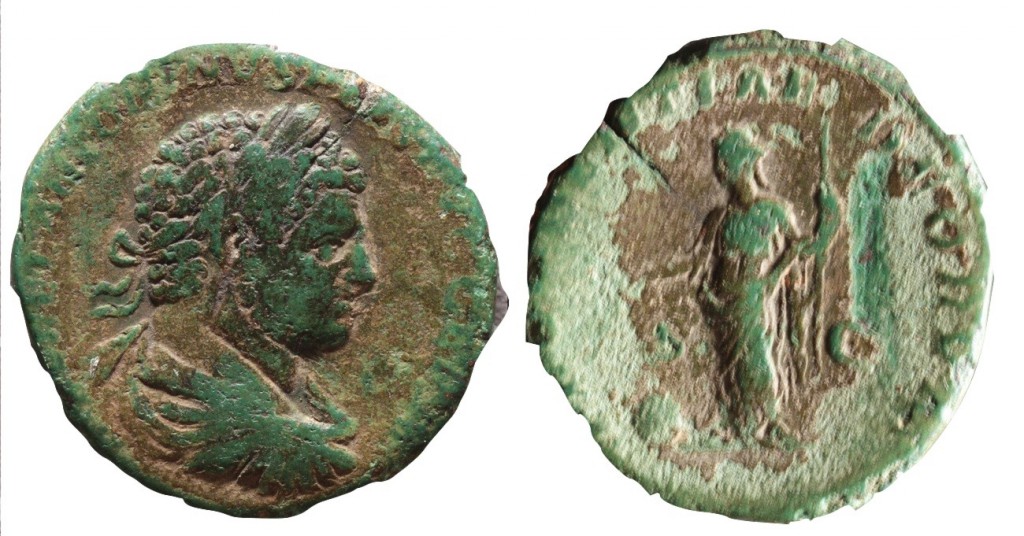April 8, 2016, by Will Leveritt
On this day in AD217 the Roman emperor Caracalla was assassinated near the city of Carrhae
Text by Mike Welbourn
Image Mint Imperials
Caracalla was born in Lugdunum (modern-day Lyon in France) on 4 April, 188. His father was the emperor Septimius Severus, his mother was the empress Julia Domna. Caracalla’s birth name was Lucius Septimius Bassianus.

AE of Caracalla. Observe has laureate head of emperor right. Reverse has standing female figure with spear, S C in fields.
In 193 his father declared himself emperor after the murder of Pertinax and two years later he proclaimed his son Caesar (effectively marking him out as Septimius’ successor) and renamed him Marcus Aurelius Antoninus in order to forge a link to the fondly remembered emperor, Marcus Aurelius. He gained the name Caracalla later, as a result of the Gallic type of tunic he often wore.
Septimius secured the imperial throne via a civil war. By 197 he had defeated the last of his rivals, Clodius Albinus, and in the next year elevated Caracalla to the rank of co-emperor; Caracalla’s name changed once more to Caesar Marcus Aurelius Antoninus Augustus.
Septimius had younger son, Geta, who like Caracalla became a co-emperor with his father, in his case in 209. In February, 211 Septimius Severus died at York and his two sons succeeded him. Caracalla’s name changed one last time to Imperator Caesar Marcus Aurelius Severus Antoninus Pius Augustus.
The two brothers seem never to have liked each other, and the Greek senator and historian Cassius Dio tells us that Caracalla had wanted to murder Geta for some time. It seems that an atmosphere or mutual hatred, suspicion, and paranoia existed within the imperial palace.
Caracalla eventually managed to have his brother killed in December, 211: at a meeting between the two emperors and their mother, Caracalla had arranged for a group of soldiers to burst in and do away with Geta. Dio says that Geta fled to his mother, pleading for help, and was murdered in her arms. Caracalla was now the sole emperor of Rome.
Another Greek historian, Herodian, tells us that Caracalla immediately launched a purge of his brother’s friends and associates: actors, athletes, entertainers, senators, and even his own wife, Plautilla were murdered on his orders.
He also went after relations of previous emperors and dynasties such as Pertinax’s son and Cornificia, the now aged daughter of Marcus Aurelius. Geta’s friends and allies among the provincial governors and officials were also apparently done away with.
Caracalla kept the soldiers close to him and lavished money on them; his relations with the senate were considerably less rosy, but his flatterers and favourites gained great rewards. We are also told that he put financial pressure on the citizens of the empire through increasing existing taxes and instituting new ones. Meanwhile he was spending vast sums on games, and was particularly fond of hunting wild beasts.
In 213 he moved north to inspect the Danubian provinces of the empire and seems to have become popular both with the Germanic tribes on the border and with the Roman troops stationed there – it seems that he would undertake the same sorts of labours as the average legionary, endearing him to his men.
Two years later Caracalla undertook a tour of the eastern portion of the Empire, followed in 216 by an invasion of the Parthian Empire. Caracalla was seeking military glory, perhaps inspired by his hero-worship of Alexander the Great.
Dio states that he had tried to gain control of the Parthian Empire by asking the king, Artabanus, for his daughter’s hand in marriage. When the king saw through the scheme, Caracalla invaded Parthia and ravaged a portion of it.
The Parthians began to prepare a military response to Roman aggression and the Romans in turn, made ready to resist it. But Caracalla would not live to see the battle. As Dio tells it, Caracalla’s Praetorian Prefect, Macrinus, had been told by a seer that he would eventually attain the throne.
The seer had travelled to Rome where his prophecy came to the attention of the commander of the soldiers in the city, who wrote to Caracalla. The letter, however, was diverted and did not reach the emperor.
A second official, one Ulpius Julianus, evidently sympathetic to Macrinus, sent a letter to him telling him of the potential threat to him if the letter reached its intended destination. This seems to have spurred Macrinus to take action.
He employed two Praetorian tribunes and an experienced legionary to attack and kill the emperor. The legionary, one Martialis, chose a rather embarrassing moment to strike the emperor: Caracalla had dismounted from his horse in order to urinate when Martialis stabbed him. The tribunes followed suit and fell upon the emperor. Thus he died on 8 April 217, outside the city of Carrhae in Cilicia. He was 29 years old. Macrinus succeeded him.
No comments yet, fill out a comment to be the first

Leave a Reply